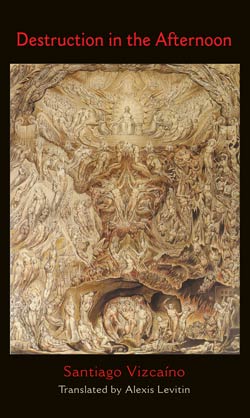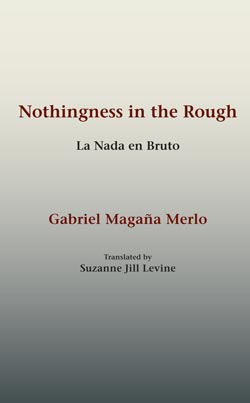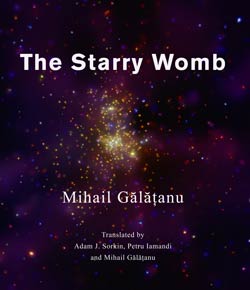Description
Santiago Vizcaíno
Translated by Alexis Levitin
ISBN 978-1-935084-66-2
120 pages: $16.00
April, 2015
How did Rimbaud end up? He ended up at Vizcaíno’s house, and now they stride dark landscapes together. Few others have this gift of metaphor—inscrutable yet radiant with truth. Few poets have Vizcaíno’s courage and tact on the subject of human frailty, the “dissolute aridity,” “this terrible mutation.” Here, in master translator Alexis Levitin’s canny versions, we can “inhale the petals of an ancient mercy” and be at the forefront of modern poetry at the same time.
—Peter Thompson, author of Angle of Incidence / Shades
The landscape of Santiago Vizcaíno’s Destruction in the Afternoon is mysterious and dark, violent, and the sense is that the living here face almost unbearable suffering and cruelty. Yet there is hope here, resigned and subdued, but hope all the same. We are left with a vision oddly non-apocalyptic. One of Ecuador’s finest poets, Vizcaíno writes into a nothingness filled with desire and ecstasy, asking only for “what was once so ordinary/humid purple air,/the murmur of life beyond the patio.” From Alexis Levitin, one of our foremost translators from the Spanish and Portuguese, I welcome this version of these beautifully corrosive, dissonant poems.
—Mark Statman, author of A Map of the Winds
Destruction in the Afternoon is a seething, narcissistic psychological journey through a human desert of torpor, anguish, mourning, despair, an aridity of the soul. The long first section, “Hands in the Grave,” is a particularly powerful delineation of death and the void, the “monster” of the body and the “coffin of time.” “We hear our voices / like a feeble manifestation of the end,” Vizcaino writes, hardly feeble himself in his compelling poetry, and in translator Alexis Levitin’s masterful hands, the translation likewise is anything but weak, frail or listless. Rather, Destruction in the Afternoon sustains a kind of dark ecstasy of negativity, the poet’s resistance to his, and our, nightmares, as the poems bloom into gorgeous verbal “flowers among the carrion.”
— Adam J. Sorkin







Reviews
There are no reviews yet.